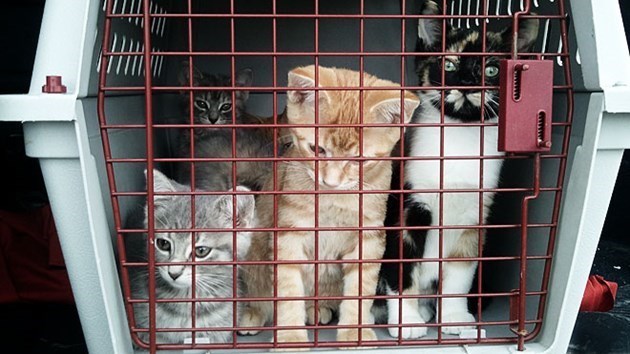When 600 pet rats were discovered in an apartment in North Bay this month, Councillor Mark King said he would like to see a bylaw introduced to control those types of situations.
A model may come from our neighbours to the west.
Greater Sudbury Council has passed a new animal care and control bylaw based on the principles of responsible pet ownership.
The new by-law introduces options to purchase one year, three year or lifetime dog and cat licences, allows pet owners to keep as many spayed or neutered dogs and cats as they wish, and includes regulations for the basic care of pets.
A bylaw to regulate the keeping of animals, responsible pet ownership and the registration of dogs and cats will take effect March 1.
Until that date, enforcement of regulations related to local dogs and cats and requirements for annual pet licensing will remain under the current municipal By-law.
“We are pleased to introduce a by-law that reflects the philosophy and the wishes of Council, local pet owners and the animal welfare and rescue community,” said Melissa Laalo, Greater Sudbury Animal Care and Control Bylaw Coordinator.
“Responsible pet ownership was a recurring theme during our public consultations and in a survey of best practices within other large municipalities.”
Highlights of the new bylaw include:
- No limit on the number of spayed or neutered dogs and cats permitted per household. Households with unaltered pets are limited to two dogs and two cats. A four pet limit remains until Feb. 28
- Moving a requirement for purchase of an annual pet licence from the animal control by-law to the municipal user fee by-law so that pet owners will have a choice of one year, three year or lifetime dog and cat licences. The current one year pet licence remains a requirement until February 28, 2017.
- Permission to allow pet cats to roam outdoors, provided the cat is vaccinated, microchipped, licensed, spayed or neutered. The by-law obliges owners to ensure their cats are not causing a nuisance, damaging property or creating excessive noise while outdoors.
- A new section in the by-law for rescue groups to clearly define the rights and obligations of both the municipality and volunteers. The section includes provisions for the humane management of feral cat colonies.
- Regulations for adequate and appropriate care for the health and well-being of dog and cats, including sufficient food and water, proper enclosures and tethers, sanitary environments and protection from teasing or tormenting.
The new by-law contains regulations for the investigation, classification and restraint of vicious dogs. In the case of a reported dog attack or bite, the role of the municipality is to assess the level of threat to public safety.
If a dog is found “vicious” under the bylaw, owners are ordered to muzzle, tether, confine and leash the dog at all times, except when the dog is home and indoors, and to microchip the dog for identification purposes.
Depending on the severity of the bite or attack, the City of Greater Sudbury may exercise its rights under the provincial Dog Owner’s Liability Act to go before a Justice of the Peace to request a warrant to remove a vicious dog from its home. The dog is held in care of the municipality until a hearing before the Ontario Court of Justice determines its fate and penalties for the dog owner.
Under the Dog Owner’s Liability Act, owners are liable for the actions of their dog if it can be proven before the court that the dog has bitten or attacked a person or domestic animal, has behaved in a manner that poses a menace to the safety of persons or domestic animals or the owner did not exercise reasonable precautions to prevent a dog from biting, attacking or posing menace.



